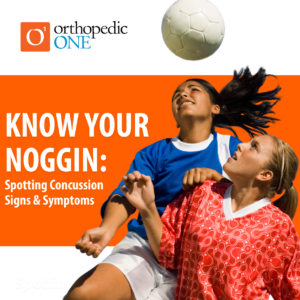Know Your Noggin: Spotting Concussion Signs & Symptoms
While the signs and symptoms of most injuries arise nearly instantly—a bump, a bruise, or a burn—concussion symptoms are more difficult to spot. Identifying the symptoms and knowing how to address them is vital for a successful recovery process.

What is a Concussion?
A concussion is a brain injury resulting from an impact that jostles the brain within the skull. This impact damages brain cells and blood vessels, causing chemical changes that affect brain function, including thought, emotions, behavior, and sleep. Most concussions are mild, but untreated ones can have serious long-term effects. Early identification of concussion symptoms can mean a quicker recovery and return to activities.
Spotting the Signs & Symptoms
Concussion symptoms often appear shortly after the injury, but they can also manifest hours or days later, mimicking a sleepless night or the common cold. Recognizing concussion symptoms and knowing when to seek emergency care can help keep you and your loved ones safe.
Immediate Symptoms:
- Memory loss
- Dazed or stunned
- Confusion or difficulty concentrating
- Uncoordinated
Additional Symptoms:
- Headache
- Nausea or vomiting
- Dizziness
- Impaired vision
- Sensitivity to light or noise
- Feeling sluggish or groggy
Severe Symptoms:
- One pupil larger than the other
- Inability to wake up
- Worsening headache
- Slurred speech
- Muscle weakness, numbness, or decreased coordination
- Repeated vomiting or nausea
- Convulsions or seizures
- Unusual behavior, restlessness, or agitation
- Loss of consciousness
- Fluid or blood draining from the nose or ears
- Chronic ringing in the ears
If you experience any severe concussion symptoms, call 911 immediately. Though rare, a concussion can evolve into a life-threatening condition. If a mild concussion is suspected, the team at Orthopedic ONE can connect you to our extensive network of care partners offering specialized treatment plans to meet your needs and keep you healthy after a concussion. Contact our Sports Medicine Hotline to learn more!
Embracing Recovery
Sticking to a recovery plan is vital to preventing the onset of more severe concussion symptoms. Monitoring symptoms and allowing adequate time to rest will get you moving and back to your regular routine.
Brain Rest
Just as your body needs rest after an injury, so does your brain! Avoid activities that strain your brain, like texting, reading, watching TV, playing video games, and listening to loud music. Also, avoid over-the-counter pain medications such as aspirin or ibuprofen, as they can increase the risk of brain bleeding.
Light Activity
Limit yourself to light activities such as outdoor walks. If symptoms worsen, reduce activity. Your physician will determine once you can gradually return to work or school—generally after several days of light activity without worsening symptoms. Be sure to schedule follow-up appointments with your healthcare provider to monitor your progress. As symptoms improve, your physician will help guide you back into your regular activities and schedules.
If you suspect a mild concussion, call the Orthopedic ONE Sports Medicine Hotline. Our specialists will evaluate your condition and create a personalized recovery plan. When it comes to your health, timing is everything. At Orthopedic ONE, we’re here to help you recover and get you back to your regular routine.
Sources:
Heads Up Athletes: 3 Things Orthopedic ONE Wants You to Know About Concussions